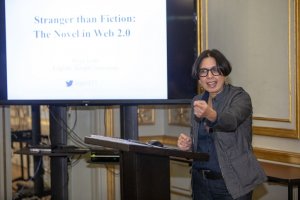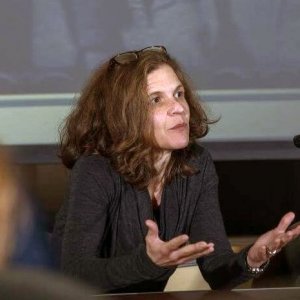Council of Endowed Chairs Lecture Series
2020
‘Wake Up to Climate Change’ – Harmful Algal Blooms and Other ‘Nasties’ in Our Coastal Waters
Jason E. Adolf, Ph.D.
Endowed Associate Professor of Marine Science, Biology Department and Urban Coast Institute at Monmouth University
Presented as Part of the 2020 Monmouth University Climate Crisis Teach-In
Oct. 27, 2020
Harmful Algal Blooms (HABs) occur when phytoplankton accumulate and have a negative impact on aquatic ecosystems. Deoxygenation, toxin production, and fish kills are the most visible adverse effects worldwide, and each of these occurs in NJ as well. While HABs and other ‘nasties’ in our coastal waters come from various sources, climate change unfortunately seems to be making the problem worse. This talk will discuss how climate change is expected to impact coastal waters, focusing on HABs and microbial pollution research done by Monmouth University faculty and students in the Phytoplankton and Harmful Algal Bloom lab (PHABLab). Actions suggested or supported by our research results will be discussed as well.
2019
Stranger than Fiction: The Novel in Web 2.0

Priya Joshi, Ph.D.
Professor of English, Temple University
Ink & Electricity: Advancing Liberal Learning in the Digital Age Lecture Series
Sponsored by the Wayne D. McMurray Endowed Chair in the Humanities
Oct. 30, 2019
The term Web 2.0 was coined to characterize a participatory digital experience in which users interact with content, remix it, and eventually shape the collective pool. Today, an entire archive of fiction is being produced and curated by readers on Web 2.0 platforms, far from the attention of mainstream publishing. Fan sites, new writing platforms, and new markets for the novel have reworked both the scale of “publishing” as well as its participants. In this talk, Priya Joshi, Ph.D. reviews the story of “literature” in the age of digital production with particular attention to the future of literary theory under web 2.0.
Climate Change and the Voiceless: Protecting Future Generations, Wildlife, and Natural Resources
Professor Randall Abate
Rechnitz Family/Urban Coast Institute Endowed Chair in Marine and Environmental Law and Policy and Professor of Political Science, Monmouth University
CEC Fall Semester Lecture Series
Sponsored by the Rechnitz Family/Urban Coast Institute Endowed Chair in Marine and Environmental Law and Policy
Sept. 26, 2019
Future generations, wildlife, and natural resources—collectively referred to as “the voiceless” in this presentation—are the most vulnerable and least equipped populations to protect themselves from the impacts of global climate change. Domestic and international law protections are beginning to recognize rights and responsibilities that apply to the voiceless community; however, these legal developments have yet to be pursued in a collective manner and have not been considered together in the context of climate change and climate justice. Professor Abate’s presentation first identifies the common vulnerabilities of the voiceless in the Anthropocene era. It then proposes how the law can evolve to protect their interests more e effectively through a stewardship-focused and rights-based system derived from the mandate inherent in the concept of sustainable development.
‘What Did ISIS Do to You?’ Media Ethics and the Problematic Reporting on Yazidi Survivors of Sexual Violence

Johanna Foster, Ph.D.
Helen McMurray Bennett Endowed Chair of Social Ethics and Associate Professor of Sociology, Monmouth University
CEC Spring Semester Lecture Series
Sponsored by the Helen McMurray Bennett Endowed Chair of Social Ethics
February 25, 2019
In 2014, the Islamic State of Iraq and Syria (ISIS) brutally attacked the Yazidi people living in towns and villages throughout the Sinjar region of Iraq. The assault was designed to destroy the religious minority group through rape, mass executions, and forced religious conversions. Militants killed an estimated 3,100 Yazidis, mostly men and boys, and abducted another 6,400, predominantly women and children. While thousands still remain in captivity today, months after the attack, thousands of women escaped, and journalists from around the world raced to cover their harrowing experiences as torture survivors. In this lecture, Dr. Foster presents the findings from her collaborative research project on the ways in which reporters in these early months after the attack violated basic ethical standards for reporting on sexual violence in conflict zones, as well as Yazidi women’s own perceptions of the impact of the media frenzy.
